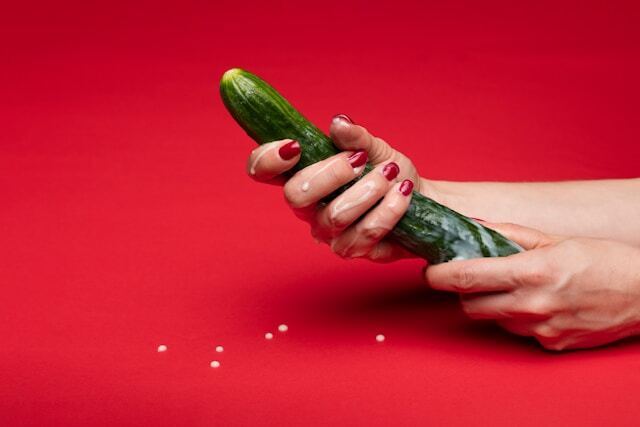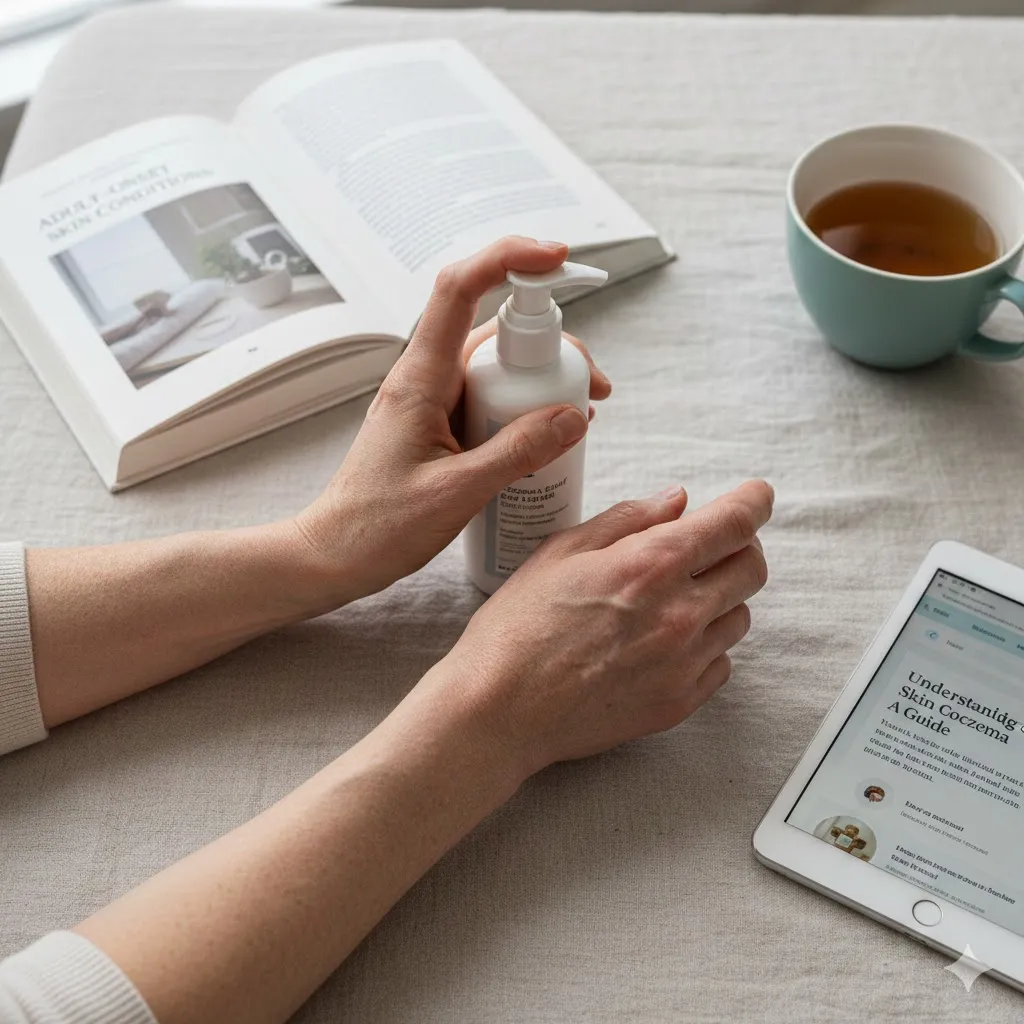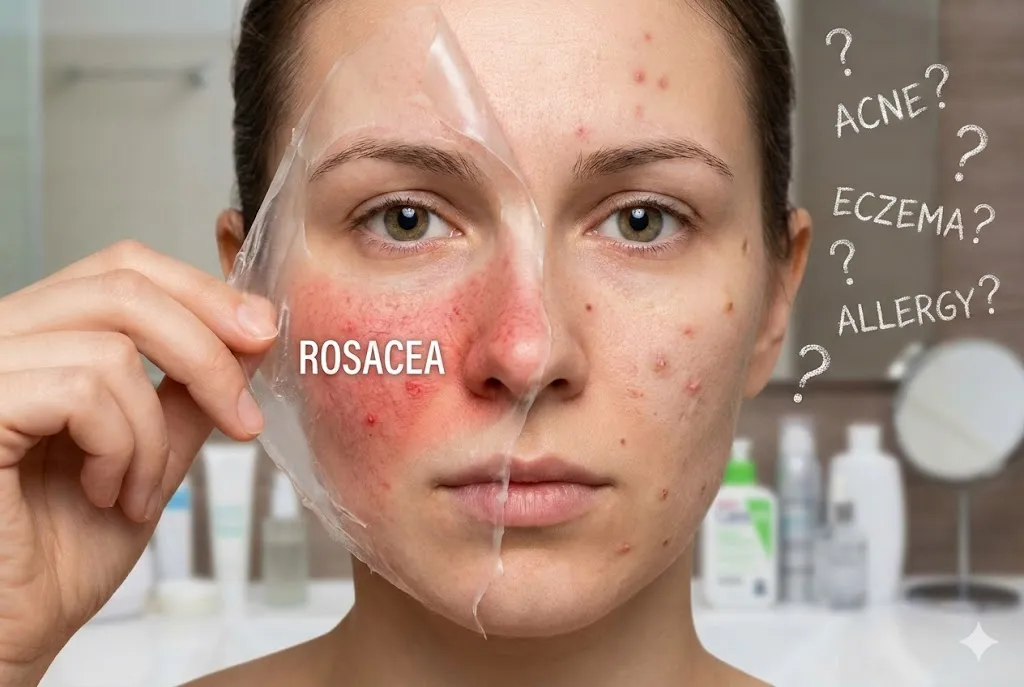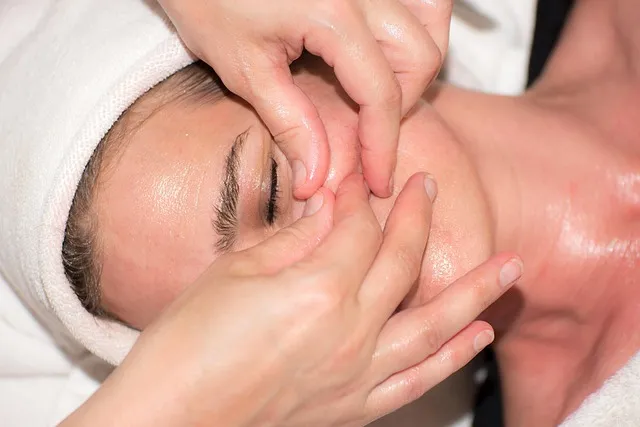Imagine waking up one morning and finding your lips swelled overnight. Swollen lips can be confusing and worrying. While they might be harmless in some cases, they can also indicate underlying health issues or allergic reactions, leaving you searching for "Why is my lip swollen for no reason?" Let's explore every possibility through this blog. We'll find out what it feels like and how to treat it.
Why Is My Lip Swollen for No Reason: 12 Common Causes
Wondering, “What’s Causing My Lip to Swell Suddenly?” Here are the possible causes:
1. Allergies: The Common Culprit
A sudden lip swelling can be triggered by certain types of allergies. When your body encounters the allergens, the immune system finds them as a threat. It, in turn, releases chemicals, like histamine. These chemicals cause the blood vessels present in the lips to widen and leak fluid, which accumulates in the lips and causes swelling.
Those allergies include:
-
Food allergies from allergenic foods such as eggs, nuts, dairy, shellfish, peanuts, soy, and wheat.
-
Environmental allergies from environmental allergens, like pollen (from flowers), mold, dust, and pet fur.
-
Medications such as antibiotics, penicillin, pain relievers, sulfa drugs, and medicines to treat seizures.
In certain cases, the allergic reaction is mild. But, severe allergic reactions (called anaphylaxis) can lead to extreme lip swelling, accompanied by difficulty breathing, low blood pressure, and shock, requiring emergency help.
2. Angioedema: A Mysterious Under-Skin Swelling
Angioedema occurs when the skin under the top surface swells excessively. This can happen because of food and pollen allergies, medications, autoimmune disorders (like lupus), insect bites, and exposure to heat, cold, sunlight, and water, or it can run in the family. When it occurs, it might lead to the following lip swelling, along with these symptoms:
-
Swelling in the hands, face, legs, tongue, and genitals
-
Abdominal pain
-
Dizziness
-
Hives
This swelling usually goes away after a day or two. However, angioedema can be fatal and needs emergency care if swelling occurs with:
-
Wheezing
-
Trouble breathing
-
Cyanosis (marked by bluish lips, skin, and fingers)
3. Facial Traumas or Injuries: The Typical Cause
Small injuries on your lips can also cause swelling, even if you do not remember the time you got hit or injured. Those injuries can happen due to:
-
Accidental lip biting
-
Getting bumped or hit on your lips
-
Falling or landing on the face
-
Stung by an insect or bitten by a dog
-
Burn on the lips because of too hot food or drink
-
Dental procedures such as periodontal surgery and tooth extractions
Minor lip injuries can resolve within a few days with antiseptic cream. However, if the injury is deep, large (larger than 6 mm), occurs with bleeding after 15 minutes of pressure, and causes extreme pain, consult a doctor immediately for proper treatment, like stitches.
4. Cheilitis Glandularis: A Unique Lip Infection
-
This rare lip-related condition is marked by the inflammation of the minor salivary glands present in the lower lip. This leads to swelling and enlargement of the lips.
-
Moreover, severe swelling can make the lower lip turn outward, which exposes the inner lining of the lip to the external environment.
-
Factors like prolonged sun exposure, biting, and lip licking can contribute to worsening swelling by causing ulceration and crusting, leading to secondary infection.
-
Usually, this condition gets better itself, but sometimes you might need special medicine like antibiotics or corticosteroids. So, see a doctor if it doesn't get better.
5. Lip Chapping
-
Chapping or cheilitis causes lip swelling due to the irritation and inflammation that is caused by the cracking and dryness of the lip surface.
-
This makes the lip more prone to damage from external factors, like sun exposure, allergens, wind, dry weather, lip licking, and irritants, which trigger inflammation and thus swelling.
-
This happens easily because damage and cracks in the lip skin allow the allergens and irritants to penetrate deeper, which worsens inflammation and swelling.
-
In severe cases, those cracks can make the way for the bacteria to enter and cause infection, contributing to intense swelling.
6. Sunburn
-
The UV rays of the sun can damage the delicate tissue of the lips, which can trigger an inflammatory response from the body.
-
This inflammation leads to an increase in the flow of blood to the affected area, causing swelling along with redness and a burning sensation.
-
To relieve or prevent sunburned lips, avoid long exposure to the sun, use lip products with sunscreen, and wear a hat.
7. Mucoceles (Mucous Cysts)
-
When the salivary gland duct is damaged, injured, or blocked by activities like lip biting, piercing, or dental appliances, it causes saliva to leak and build up. This leads to visible sac-like swelling, called mucocele or mucous cysts.
-
These mucous cysts are generally formed on the inner lip surface, underside the tongue, or inside the cheeks.
-
They differ in appearance, but typically look clear, pink, bluish, and bumpy rather than normal swelling.
-
Usually, these cysts subside on their own, but if they persist or interrupt your eating or talking, see a doctor who can help drain or remove them surgically.
8. Nutritional Deficiencies
-
Lack of iron and vitamin B, especially B2, and impaired skin health because of low levels of omega-3 fatty acids, iron, and zinc can cause inflammation
-
This can lead to swelling along with redness in the delicate tissues of the lips.
-
Also, they can lead to angular cheilitis (cracking in the corners of the mouth), peeling, and dryness.
9. Mucoceles (Mucous Cysts)
-
When the salivary gland duct is damaged, injured, or blocked by activities like lip biting, piercing, or dental appliances, it causes saliva to leak and build up. This leads to visible sac-like swelling, called mucocele or mucous cysts.
-
These mucous cysts are generally formed on the inner lip surface, underside the tongue, or inside the cheeks.
-
They differ in appearance, but typically look clear, pink, bluish, and bumpy rather than normal swelling.
-
Usually, these cysts subside on their own, but if they persist or interrupt your eating or talking, see a doctor who can help drain or remove them surgically.
10. Infections
-
A 2023 study states that some infections caused by bacteria, fungi, or viruses can cause lip swelling. These are infections causing lip swelling:
-
Cold sores (such as Herpes Simplex Virus)
-
Cellulitis (a skin infection)
-
Angular cheilitis (cracks in the corners of the lip that become infected)
-
The infections also come along with other symptoms such as pain, redness, fever, and warmth.
-
If you see these signs, immediately report them to your doctor.
11. Melkersson-Rosenthal Syndrome: A Rare Neurological Disorder
-
This disorder causes lip swelling due to a granulomatous inflammatory process, which impacts the lips, especially the upper lip and surrounding tissues, like cheeks and tongue.
-
The granulomatous inflammatory process involves chronic inflammation by forming granulomas, which are groups of immune cells fighting off irritants that the immune system is unable to eliminate. This leads to swelling.
-
This swelling may increase and persist, which can eventually become permanent. Sometimes, it can also affect your tongue, causing lines or making parts of your face not move correctly.
-
If you have this, see a doctor so they can give you the right treatment, like corticosteroids and anti-inflammatory drugs to relieve swelling and make you feel better.
12. Cheilitis Granulomatosa: Another Rare Inflammatory Disorder
-
The National Institute of Health reports that this rare condition causes lumpy swelling in one or both lips.
-
The swelling occurs due to the accumulation of fluid and inflammatory cells in the lip tissue, which causes fluid retention and inflammation, leading to visible lip enlargement.
-
The swelling can be persistent or occur again, or slowly worsen with time.
-
Seeing the healthcare provider may help with receiving the treatment, like corticosteroids and anti-inflammatory drugs. These medicines can make the swelling go down and make you feel better.
Comparison of Upper Lip and Lower Lip Swelling
Swelling can impact either the lower or the upper lips and sometimes both. Understanding the difference can provide hints about the underlying cause. Though the symptoms may look the same, the location of lip swelling can indicate specific issues:
|
Aspect |
Upper Lip Swelling |
Lower Lip Swelling |
|---|---|---|
|
Common Causes |
|
|
|
Appearance |
|
|
|
Pain or Discomfort |
|
|
|
Possible Related Symptoms |
|
|
|
When to Worry |
|
|
What Does Swollen Lips Feel Like?
Swollen lips can feel different based on why they're swollen:
-
If your lips are swollen, you might feel puffy, tight, tingly, warm, or more sensitive than usual.
-
It could feel like your lips are bigger, and you might sense some pressure or fullness with the swelling.
-
Sometimes, a tingling or a little stinging feeling might make you uncomfortable.
-
If the swelling is because of an allergy, which is quite common, you might also feel an itchy or burning sensation along with the swelling.
-
And in some situations, your swollen lips might hurt or feel tender when you touch them.
Symptoms of Swollen Lips
The common symptoms include:
-
Enlargement of the lips
-
Puffiness
-
Redness
-
Soreness
-
Excessively sensitive to touch, air currents, or temperature changes
-
Cracked or chapped skin
Moreover, swollen lips can be accompanied by these symptoms:
-
Itching
-
Fever
-
Difficulty breathing
-
Pain
-
Rash or hives
-
Blisters
-
Drainage or pus
Home Remedies for Swollen Lips
Here are the home remedies that can be helpful:
1. Cold Compress
-
Apply an ice pack or a cold compress to the affected area for about 15-20 minutes, helping relieve swelling.
2. Over-the-Counter (OTC) Pain Medications
-
Take OTC anti-inflammatory drugs such as ibuprofen or antihistamines, like Benadryl, to reduce pain caused by swelling.
3. OTC Topical Creams
-
OTC topical creams and ointments, ingredients like hydrocortisone can help alleviate lip swelling. Apply it as directed.
4. Avoid Triggers
-
If certain foods or cosmetic products are causing swelling, avoid them completely.
5. Aloe Vera
-
Fresh aloe vera gel or ointment can aid in soothing sunburned or chapped lips, thus reducing swelling.
6. Moisturizing Lip Balm
-
Apply a lip balm that consists of moisturizing ingredients, like glycerin, dimethicone, or lanolin, as they help prevent dryness and cracks in the lips. This, in turn, reduces swelling.
7. Saltwater Rinse
-
Mix 1/2 teaspoon salt in some warm water and rinse your mouth using it to lessen swelling and ease healing.
8. Honey
-
The antimicrobial qualities of honey can help relieve mild swelling. Just directly apply the raw honey to your lips.
9. Stay Hydrated
-
Drink plenty of water, as dehydration can also contribute to swollen lips.
How Long Does Lip Swelling Last?
In general, lip swelling resolves within one week. But the duration can vary based on the underlying cause:
-
Minor trauma or injury: Within a few days to 1 week.
-
Allergic reaction: Within a few hours to days, particularly with antihistamines.
-
Angioedema: Within 24 to 48 hours.
-
Infection: Several days to weeks with antibiotic treatment.
-
Granulomatous cheilitis: Recurs
If the lip swelling worsens or persists for more than 1 week, or comes along with other symptoms, like pain, difficulty breathing, or fever, seek medical help.
When To See A Doctor For a Swollen Lip?
You should visit or see a healthcare specialist if:
-
Lip swelling is persistent for more than 1 or 2 days.
-
Swelling causes breathing or swallowing issues.
-
You suspect the swelling is spreading to the whole face.
-
An allergy is the cause of swollen lips.
-
If your swelling comes with other things like hives (red, itchy bumps on your skin), feeling dizzy, or signs of a serious allergic reaction.
-
Having a fever, signs of infection, or any unusual discharge from your lips.
-
No improvement after several days.
Professional Treatment for Swollen Lips
The healthcare providers may assess the symptoms, potential triggers, and medical history, and then provide the prescription medicines depending on the underlying causes:
Antihistamines
-
If an allergic reaction is the cause of lip swelling, doctors may prescribe antihistamines such as cetirizine and diphenhydramine.
Corticosteroids
-
The doctors may also suggest oral or topical corticosteroids, such as hydrocortisone or prednisone, to relieve inflammation and severe swelling.
Antibiotics
-
If bacterial infections, like cellulitis are are culprits, a course of antibiotics can be helpful.
Antiviral Medications
-
For viral infections such as cold sores, the antiviral medications such as valacyclovir or acyclovir may be prescribed.
Epinephrine (EpiPen)
-
For anaphylaxis, a severe allergic reaction, epinephrine is administered immediately to save life.
In case the cause is unclear and swelling recurs, the healthcare professionals recommend allergy testing to detect specific allergies or blood tests to identify genetic or autoimmune conditions.
How To Prevent Lip Swelling In The Future?
Here are the tips you can follow:
1. Identify and avoid known allergens and irritants:
-
Keep track of any type of medications, foods, cosmetic products, or environmental factors that have caused allergic reactions in the past.
-
Identify and eliminate them from your daily routine.
2. Prioritize good oral hygiene:
-
Poor oral or dental hygiene can cause a mouth or gum infection, which can contribute to lip swelling.
-
So, brush your teeth daily, floss once, and schedule dental checkups regularly.
3. Choose hypoallergenic lip products:
-
Use only dermatologist-tested and fragrance-free lip products, such as lipsticks, lip balms, and toothpaste.
-
This alleviates the risk of irritation.
4. Protect the lips from the sun's exposure:
-
Apply a lip balm that consists of more than SPF 15 before going outside.
-
This prevents swelling related to sunburn.
5. Stay hydrated:
-
Drink a lot of water to protect against cracking and dryness, which can contribute to inflammation and swelling.
-
Staying hydrated can also guard against damage related to weather changes.
6. Avoid lip biting or picking:
-
Continuous lip biting or picking can lead to repeated trauma or injury.
-
This, in turn, can cause swelling, bleeding, or infection.
7. Be cautious with new skincare or cosmetic products:
-
Always do a patch test on your skin before using any new cosmetics or skincare products near your mouth.
-
This can help you check for an allergic reaction, which is responsible for lip swelling.
8. Limit acidic or spicy foods:
-
The acidity and capsaicin compound found in foods, such as hot spices, citrus fruits, and tomatoes, can irritate sensitive lips in some individuals.
-
Also, capsaicin-containing spicy foods can cause a burning sensation and trigger an allergic reaction, which can lead to swelling in the lips.
9. Guard against extreme weather:
-
In dry, cold, or windy weather, use a protective lip balm or scarf.
-
This reduces irritation and inflammation that is caused by the cracking and dryness of the lip surface, thus preventing swelling.
10. Wear a mouthguard when required:
-
If you play contact sports, use your mouthguard to protect your lips from injury or trauma.
-
If you grind your teeth at night, wear a night guard to prevent damage to the soft tissues and teeth, which reduces the risk of lip swelling.
11. Manage allergies and medications:
-
If you have a history or are struggling with allergic reactions and take certain medications that cause angioedema, see a healthcare professional.
-
The providers can help with other safer alternatives to manage those issues.
Final Thoughts
From allergies and angioedema to infections, injuries, or even medication side effects, several factors can cause unexpected lip swelling. If you’ve ever found yourself wondering why is my lip swollen for no reason, it’s important to consult a qualified doctor or dermatologist. Self-treating without knowing the cause can sometimes worsen the condition, especially if it’s linked to an allergic reaction or underlying health issue.
While mild cases may improve with cold compresses or over-the-counter antihistamines, only a medical professional can identify the exact reason and recommend the safest treatment. Seeking timely medical help not only brings relief but also prevents future flare-ups.
Keeping your lips moisturized, avoiding known allergens, and maintaining good oral and skin hygiene can go a long way in keeping your lips healthy and swelling-free.
Disclaimer: This article is for informational purposes only and is not a substitute for medical advice or treatment. Always consult with a qualified healthcare provider for any medical issues.
Also Read: The Best Ways To Manage And Treat Lip Eczema
Frequently Asked Questions
Will swollen lips go away?
Major cases of swollen lips do not need emergency medical care and will subside itself. But if swelling persists, see a doctor for proper diagnosis and treatment.
Can salt cause swelling in the lips?
Yes, consumption of high amounts of salt at night can lead to lip swelling. This is due to water retention, as sodium causes the body to retain extra water to dilute the salt.
Why is my lip swollen on one side?
It can be due to localized issues, such as trauma, an insect bite, or a dental infection.
How can I differentiate between an allergic reaction and other causes of lip swelling?
Allergic reactions often lead to itching, hives, and a rapid onset of swelling, while other causes, like trauma, may have different symptoms and a slower progression.
When should I seek medical attention for swollen lips?
In case there are experience severe swelling difficulty breathing, or if other concerning symptoms accompany the swelling, seek immediate medical help.
Can over-the-counter medications help with swollen lips?
Over-the-counter antihistamines or pain relievers may provide temporary relief, but it's essential to consult a healthcare professional can have a proper diagnosis and treatment plan.
What should I do for minor lip swelling due to trauma or injury?
Applying some cold compress or ice pack can help reduce swelling. However, it's best to consult a doctor for severe or persistent symptoms.
Are there any preventive measures for swollen lips due to allergies?
Avoiding known allergens and seeking advice from an allergist for allergy testing and treatment can help prevent allergic reactions and subsequent lip swelling.
-User-1754377709.png)
Reviewed by







